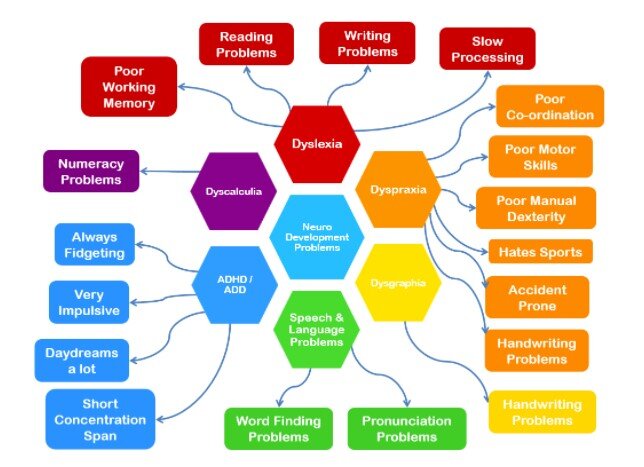It has happened again! Lockdown 3.0 has arrived and parents across the UK are supporting remote learning for their children again. With dyslexia in the mix, there are things that we can do as parents to help our children improve remote learning outcomes. Check out this latest resource.
A lot of people will know the term ‘Dyslexia’ but perhaps do not really know the challenges that this neurological ‘condition’ presents for a child in a classroom, or for that matter, at home!
The diagram below summarises these challenges really well because .
What you can see from this diagram is how teachers and parents need to consider the challenges that dyslexic learners face, especially in these uncertain times. What is almost certain is that many of our children will be learning from home until after the February break.
So what can parents do to support remote learning outcomes for their dyslexic child?
This will be a theme that I will try to help with answering over the next few weeks, but for now I came across a web page that makes some interesting points that are worth considering as we support our children.
How to help your dyslexic child by Dyslexia Gold.
Dyslexia Gold is a BDA Assured software intervention for dyslexia. Personally, whilst I have heard of it, I don’t have any experience of it so I can’t attest to how useful it is, but I have heard good things.
I mention them because I absolutely love companies that seek to share useful content that educates and inspires rather than just give out a sales pitch. As a result, if the content is useful then I will happily share it!
On the Dyslexia Gold website there is a web page that talks through a number of topics that are worth considering when finding ways to support our children whilst they are remote learning.
I especially like the range of topics that they cover which seems to be written from a more holistic perspective. Everyone’s brains change all the time. We are forever making new connections within our brains and so whilst dyslexia is not something that is ‘curable’ , the brain’s neuroplasticity can be trained to overcome many of the challenges associated with being dyslexic. In this resource, Dyslexia Gold does a good job of sharing elements that help.
About Dyslexia
Whilst you are on their website then their ‘About Dyslexia’ page is also extremely useful to read and you can get to that page by clicking the button below:
Suspect that your child has dyslexia?
If you are looking for an initial indication that you child may be dyslexic then click the button below to use the Dyslexia Gold Screening tool. It is not free, but you will gain insight as to whether you should consider taking your child for a diagnostic assessment.




